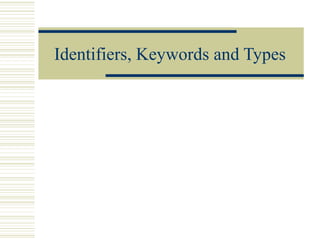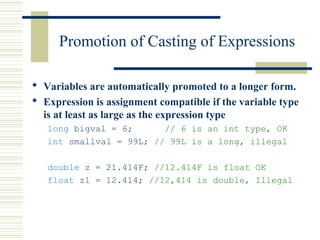java tutorial 2
- 1. Identifiers, Keywords and Types
- 2. Objectives Comments Identifiers Keywords Primitive types Literals Primitive variable and Reference Variable Variables of class type Construct an object using new Default initialization
- 3. Comments Three permissible styles of comment in a Java technology Program are // Comment on one line /* Comment on one or more lines */ /** Documentation comment */
- 4. Semicolons, Blocks and Whitespace A statement is one or more lines of code terminated by a semicolon (;) total = a + b + c + d + e; A block is a collection of statements bound by opening and closing braces { x = y + 1; y = x + 1; }
- 5. Semicolons, Blocks and Whitespace You can use a block in a class definition Public class MyDate{ private int day; private int month; private int year; } You can nest block statements Any amount of whitespace is allowed in a Java Program
- 6. Identifiers Are names given to a variable, class or method Can start with a letter(alphabet), underscore(_), or dollar sign($) Are case sensitive and have no maximum length Egs identifier username user_name _sys_var1 $change
- 7. Java Keywords abstract do implements private this boolean double import protected throw break else instanceof public throws byte extends int return transient case false interface short true catch final long static try char finally native strictfp void class float new super volatile continue for null switch while default if package synchronized
- 8. Primitive Types The Java programming language defines 8 primitive types Logical boolean Textual char Integral byte, short, int and long Floating double and Float
- 9. Logical-boolean The boolean data type has two literals, true and false Example //declare the variable flag and assign it the value true boolean flag = true; Note: There are no casts between integer and boolean types
- 10. Textual – char and String char Represents a 16 bit Unicode character Must have its literal enclosed in single quotes(‘ ‘) Uses the following notations ‘a’ The letter a ‘t’ A tab ‘u????’ A specific unicode character Eg. ‘u03A6’ is the Greek letter phi ϕ
- 11. Textual – char and String String Is not a primitive data type, it is a class Has its literal enclosed in double quotes (“ ”) “The quick brown fox jumps over the lazy dog” Example String greeting=“Good Morning!!n”; String errorMessage=“Record not found!”;
- 12. Integral- byte, short, int and long Uses 3 forms – Decimal, octal or hexadecimal 2 The decimal value is two 077 The leading 0 indicates an octal value 0xBAAC The leading 0x indicates a hexadecimal value Default is int Defines long by using the letter L or l
- 13. Range of Integral data types Type Name Length Range byte 8 bits -27 to 27 -1 short 16 bits -215 to 215 -1 int 32 bits -231 to 231 -1 long 64 bits -263 to 263 -1
- 14. Floating Point – float and double Default is double Floating point literal includes either a decimal point or one of the following: E or e (exponential value) F or f (float) D or d (double) 3.14 A simple floating point value (double) 6.02E23 A large floating point value 2.718F A simple float size value 123.4E+32D A Large double value with a redundant D
- 15. Floating point data type Ranges Note – Floating point literals are double unless explicitly declared as float Type Name Length float 32 Bits double 64 Bits
- 16. Java Reference Types Beyond primitive types all others are reference types A reference variable contains a handle to an object class MyDate{ private int day = 1; private int month=1; private int year=2002; } public class TestMyDate{ public static void main(String args[]){ MyDate today = new MyDate(); } }
- 17. Constructing and Initializing Objects Calling new Xxx() to allocate space for the new object results in: Memory Allocation Explicit attribute initialization is performed A constructor is executed Variable assignment is made to reference the object Example MyDate dob = new MyDate(17, 3, 1976);
- 18. Memory Allocation and Layout A declaration allocates storage only for a reference: MyDate dob = new MyDate(17,3,1976); dob Use the new Operator to allocate space for MyDate: ???? ???? 0 0 0 dob day month year
- 19. Explicit Attribute Initialization ???? 1 1 2002 dob day month year MyDate dob = new myDate(17,3,1976); • The default values are taken from the attribute declaration in the class
- 20. Executing the Constructor ???? 17 3 1976 dob day month year MyDate dob = new myDate(17,3,1976); • Executes the matching constructor
- 21. Variable Assignment 0x91abcdef 17 3 1976 dob day month year MyDate dob = new myDate(17,3,1976); • Assign newly created object to reference variable
- 22. Assignment of Reference Variables int x = 7; int y = x; MyDate s = new MyDate(22, 7, 1974); MyDate t = s; t = new MyDate(22, 12, 1974); •A variable of class type is a reference type
- 23. Pass-by-Value The Java programming language only passes arguments by value When an object instance is passed as an argument to a method, the value of the argument is a reference to the object The contents of the object can be changed in the called method, but the object reference is never changed PassTest.java
- 24. The this Reference Few uses of the this keyword To reference local attribute and method members within a local method or constructor This is used to disambiguate a local method or constructor variable from an instance variable To pass the current object as a parameter to another method or constructor MyDate.java
- 25. Java Coding Conventions Packages package banking.objects; Classes class SavingAccount; Interfaces interface Account Methods balance Account() Variables currentCustomer() Constants HEAD_COUNT MAXIMUM_SIZE
- 26. Expressions and Flow Control
- 27. Objectives Distinguish Instance and local variables Identify and correct a Possible reference before assignment Java Operators Legal and illegal assignments of primitive types Boolean expressions Assignment compatibility and casts Programming constructs
- 28. Variables and Scope Local variables are Variables that are defined inside a method and are called local, automatic, temporary or stack variables Variables that are created when the method is executed are destroyed when the method is exited Variables that must be initialized before they are used or compile time errors will occur.
- 29. Variable Scope Example Execution Stack 4 5 7 8 scopemain this i j this i j firstMethod secondMethod 1 ScopeExample Heap Memory i TestScoping.java
- 30. Logical Opeators The boolean operators are ! – NOT & - AND | - OR ^ - XOR The Short-Circuit operators are && - AND || - OR Ex MyDate d; If((d != null) && (d.day>31)){ //do something }
- 31. Bitwise Operators The Integer bitwise operators are: ~ - Complement & - AND ^ - XOR | - OR Examples 0 0 1 0 1 1 0 1 ~ 0 1 0 0 1 1 1 1 & 0 1 0 0 1 1 1 1 ============ =========== 1 0 1 1 0 0 0 0 0 0 0 0 1 1 0 1 0 0 1 0 1 1 0 1 0 0 1 0 1 1 0 1 ^ 0 1 0 0 1 1 1 1 | 0 1 0 0 1 1 1 1 ========== =========== 0 1 1 0 0 0 1 0 0 1 1 0 1 1 1 1
- 32. Right-Shift Operators >> and >>> Arithmetic or signed right shift (>>) is used as follows: 128 >> 1 returns 128/21 = 64 256 >> 4 returns 256/24 = 16 -256 >> 4 returns -256/24 = -16 The sign bit is copied during the shift A logical or Unsigned right shift operator(>>>) places zeros in the most significant bits 1010------ >> 2 gives 111010 ----- 1010 ----- >>> 2 gives 001010 ----
- 33. String Concatenation with + The + operator Performs String Concatenation Produces a new String: String salutation = “Dr.”; String name = “James” + “ “ + “Gosling”; String title=salutation+” “+name; One argument must be a String object Non-strings are converted to String objects automatically
- 34. Casting If information is lost in an assignment, the programmer must confirm the assignment with a typecast. The assignment between long and int requires an explicit cast long bigValue = 99L; int squashed = bigValue; //Wrong, needs a cast int squashed = (int) bigValue; //OK int squashed = 99L; //Wrong needs a cast int squashed=(int)99L; //OK int squashed=99; //default integer literal
- 35. Promotion of Casting of Expressions Variables are automatically promoted to a longer form. Expression is assignment compatible if the variable type is at least as large as the expression type long bigval = 6; // 6 is an int type, OK int smallval = 99L; // 99L is a long, illegal double z = 21.414F; //12.414F is float OK float z1 = 12.414; //12,414 is double, Illegal
- 36. Branching and Looping Statements The if, else Statement The switch Statement The for Statement The while Loop The do/while statement Special Loop Flow Control break [label]; continue [label]; label: statement; // Where statement should be a loop
















![Java Reference Types
Beyond primitive types all others are reference
types
A reference variable contains a handle to an object
class MyDate{
private int day = 1;
private int month=1;
private int year=2002;
}
public class TestMyDate{
public static void main(String args[]){
MyDate today = new MyDate();
}
}](https://image.slidesharecdn.com/basicjava2-150404022022-conversion-gate01/85/java-tutorial-2-16-320.jpg)



















![Branching and Looping Statements
The if, else Statement
The switch Statement
The for Statement
The while Loop
The do/while statement
Special Loop Flow Control
break [label];
continue [label];
label: statement; // Where statement should be a loop](https://image.slidesharecdn.com/basicjava2-150404022022-conversion-gate01/85/java-tutorial-2-36-320.jpg)